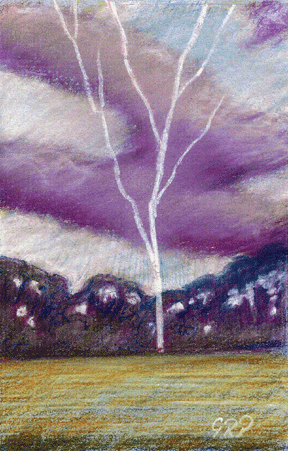Earth Journal by Gary Pendleton
July’s Supercharged Skies
Be careful you don’t become a lightning rod
If, like me, you’ve been watching the skies, you’ve seen as much lightning as fireworks. The heavenly flashes bring to mind a classic television program.
Readers of a certain age might remember a show called To Tell the Truth. That might have been what I was watching when I first heard about Roy Sullivan, the human lightning rod. It was a long time ago, so I am a little fuzzy on the details, but Mr. Sullivan, who was a ranger at Shenandoah National Park had been struck by lightning multiple times.
A few years later he showed up on another TV show; I think it was That’s Incredible. By then, the 1970s, Ranger Sullivan had been struck a few more times. All told Sullivan is reported to have been struck seven times, earning him a listing in the Guinness Book of World Records.
In 1974, Sullivan swore that a cloud was chasing him, and he broke his ankle trying to get away. The lightning was faster.
In Bulgaria, a woman lost three husbands to lightning.
Lightning strikes can deliver a super-powerful charge of up to 30 million volts. Here’s how the electricity works: A thundercloud develops a negative charge at its base and a positive charge at the top. The charge builds when rapidly moving ice or rain within the cloud creates friction. As the positive and negative charges repel each other within the cloud, the ground below becomes positively charged. This creates a growing electrical field between the cloud and ground. When the field reaches a threshold, lightning strikes.
A leader, or bolt, moves from the cloud, followed immediately by a strong return stroke from the other direction. Sometimes lightning strikes between clouds. The sudden and powerful release of heat compresses the air and creates a sound wave of thunder.
Safety experts say that to avoid Ranger Sullivan’s fame, you should take cover in a substantial building or a vehicle with windows completely shut. Avoid metal objects such as wires, sheds, equipment and power tools.
Unsafe places include under trees, small rain shelters and canopies. Try to avoid other people, keeping 15 feet distance and crouching down with your feet together. Make yourself comfortable, because with the way weather has been this summer, you might spend a lot of time in that position.
If you’re inside, stay off the phone and unplug appliances. If lightning strikes your house, it can zap your fridge, washer or computer and hurt you if you are nearby. Also avoid water indoors and stay away from doors and windows.
My cats have spent a lot of time this summer under the bed. They are no dummies.